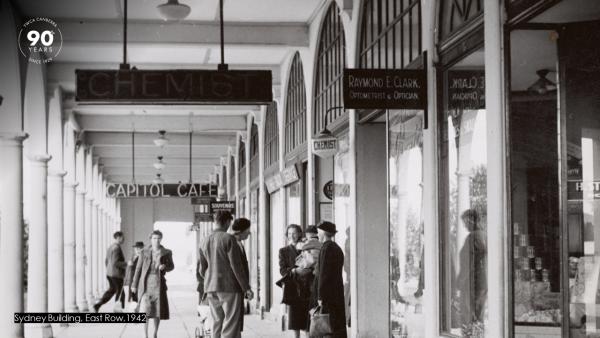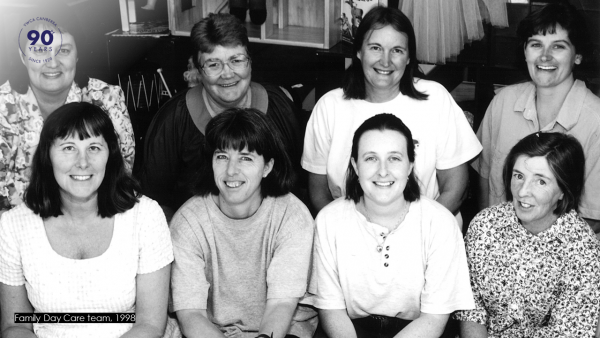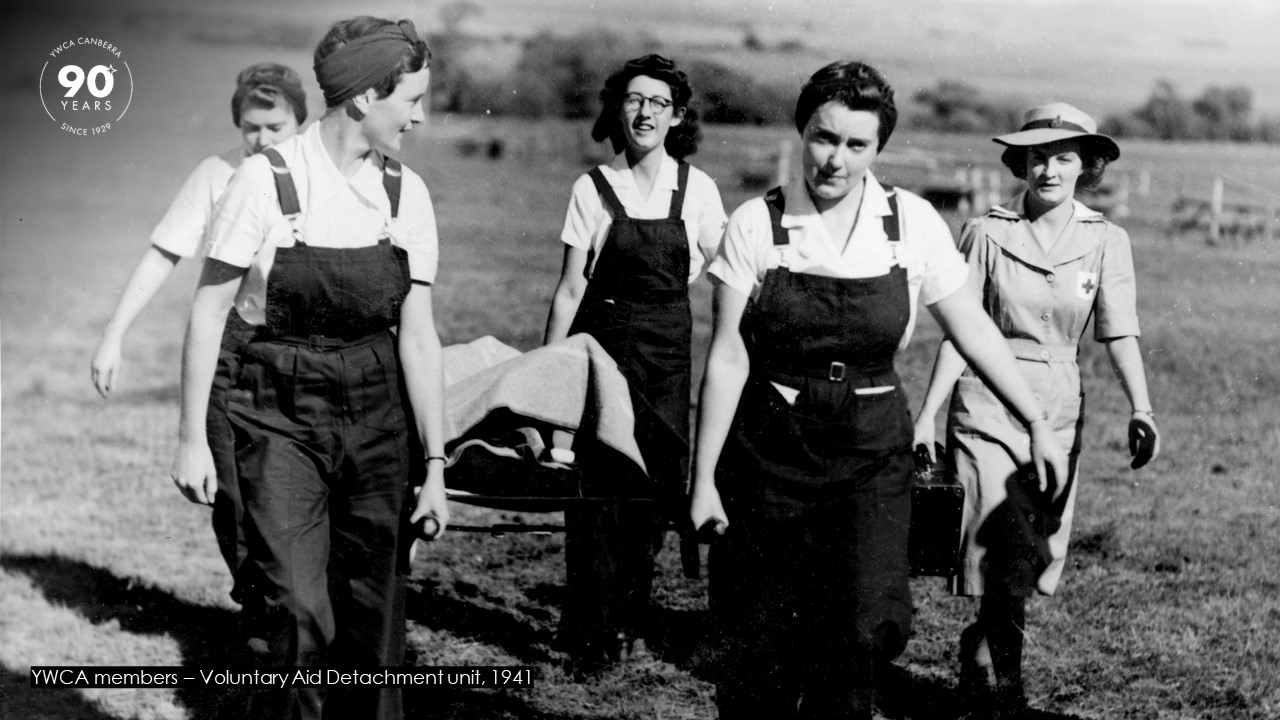Y is one of the largest women’s organisations around the world. What is the essence of the Y woman?
The essence of a Y woman is a local woman who wants to support other women and girls in their communities. It is a grassroots movement of women serving girls and women in their communities, which is why every YWCA has the same core principle, but we’re all unique just like our communities are unique.
It is a grassroots movement of women serving girls and women in their communities
The YWCA Canberra was also unique in that it was invited to establish in Canberra. Normally the branches spread organically, but they wanted to make sure that when all of these young and single women moved here to establish our government, that there were suitable extra-curricular activities at that time in the 1920s when Canberra was being built. Since then, the organisation has evolved, and it has really grown with the city over the 90 years.

Sydney Building, East Row,1942 © YWCA Canberra
Over the past 90 years, what are some of the achievements that stand out to you, things that you’re most proud of?
Looking over the past 90 years, the original reason for coming to Canberra was based on the recognition that we needed a voice for young women in the place where our federal government was going to operate from. Even from those early days, it was really important that women and girls had the space to make their own communities and to influence the primary decision-making body being established in Australia at that time.
Then of course there was the Great Depression, during which YWCA established a bureau for employment to maintain minimum terms and conditions for women at that time – so even back then they were already making sure that women had access to employment and provided support. During World War II they supported the war efforts on the home front. There’s a lovely quote of that period saying that they wanted their slogan to be ‘Construction work in progress, workers wanted’.
As they moved through the 60s they realised that in order for women to have economic participation, they needed childminding services. Of course we now know that education is equally important for children, but childcare still is a core component for allowing women to work, so that’s how YWCA Canberra started providing these services. They also used to run ‘stay at home’ camps in the school holidays to enable working mothers to continue with their work.
Through the 70s we totally embraced our feminist era, and that’s when you really start to see the voices of women really coming through. Even though we were doing youth club, we were doing non-traditional youth work, such as running karate classes for girls, there were fencing classes, and a women’s cricket team.

Family Day Care team, 1998 © YWCA Canberra
YWCA has always been a provider of housing and shelter, which they first started doing over 60 years ago. And then of course there was the transitioning into making sure that it truly was a women’s organisation led by women and becoming financially sustainable – these have all been key things, making sure that the organisation is now underpinned by sustainability.
In terms of gender equality, YWCA Canberra actually did the early research in the 90s on primary prevention of violence against women – they started looking into ending violence before it occurred. In 2000s they launched a program called Relationship Things which was aimed at adolescents to start teaching consent. These are now part of the mainstream primary prevention work.
YWCA Canberra’s 90th anniversary short film © YWCA Canberra
In this constantly evolving social landscape, you must’ve encountered a fair amount of challenges as well?
Absolutely, and when I look through the history there’s been challenges – not just critical things going on in our history like the World War II and the Depression – but also things such as negotiating the rent of the buildings for our hostels. There were times when the organisation had very poor cash flow, and what the women did at those times in terms of governance to move it out of there very early on…they saw that there was going to be a shift from government funding community providers, and they started diversifying income away from being purely a government funded service. They recognised that we need to be in charge of our own sustainability, and not at the whim of the government that was still prominently men.
Throughout the history, it has been women being bold and dauntless. Their perseverance just shines through this organisation
Despite all the challenges, you have stood the test of time – what is the secret to your success?
For me, throughout the history, it has been women being bold and dauntless. Their perseverance just shines through this organisation. They have been bold in their risk taking and whatever hurdles put in front of them, they just find a way around. It is like that saying ‘and yet she persevered’. You read the stories of these women – and they really have.

Jacq Burridge, Heather Shakespeare and Fiona Browitt, 1999 © YWCA Canberra
What’s the next 90 years going to hold for you?
The beauty of YWCA and particularly the Canberra one, is that we’re responding to local community needs. We know that with gender equity, violence against women, the issues facing women in retirement – they’re all linked to housing. We are really going to embark on going back to grassroots YWCA business which is providing safe housing for women and their families, whether that’s single women in retirement, or women escaping violence.
We know that with gender equity, violence against women, the issues facing women in retirement – they’re all linked to housing
And again, we’re going to be bold. Why does property development need to be in the domain of big rich companies? What about housing by women, for women? That’s where we are heading. I believe our strength is that we’re still loud advocates on public policy, but we’ll also put our money where our mouth is and contribute to affordable, appropriate and sustainable housing in Canberra.
Anything you’d like to add?
I’m standing on the shoulders of many strong women and it’s such a privilege to be able to continue this legacy of being bold and dauntless.

YWCA Canberra CEOs and Presidents past and present cutting the 90th anniversary cake, 16 October 2019, National Museum of Canberra




